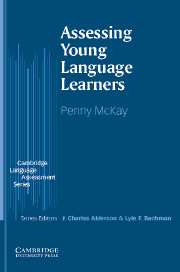Book contents
- Frontmatter
- Contents
- Series editors' preface
- Acknowledgments
- 1 A special case for young learner language assessment
- 2 Young learners and language learning
- 3 Research into the assessment of young language learners
- 4 Assessing language use through tasks
- 5 Classroom assessment of language use
- 6 Assessing oral language
- 7 Assessing reading and writing
- 8 Evaluating young learners' performance and progress
- 9 Testing young language learners through large-scale tests
- 10 The way forward
- References
- Index
- Publishers' acknowledgments
2 - Young learners and language learning
Published online by Cambridge University Press: 04 May 2010
- Frontmatter
- Contents
- Series editors' preface
- Acknowledgments
- 1 A special case for young learner language assessment
- 2 Young learners and language learning
- 3 Research into the assessment of young language learners
- 4 Assessing language use through tasks
- 5 Classroom assessment of language use
- 6 Assessing oral language
- 7 Assessing reading and writing
- 8 Evaluating young learners' performance and progress
- 9 Testing young language learners through large-scale tests
- 10 The way forward
- References
- Index
- Publishers' acknowledgments
Summary
Introduction
Assessing the language learning of young learners requires knowledge of both the general characteristics of young learners, as were outlined in Chapter 1, and tied to this, knowledge of the characteristics of their language learning. Knowledge of children's approach to, and needs in, second language learning is critical for fair and valid language assessment. Without an understanding of children's language learning, teachers and assessors might make choices about assessment that result in some or all children being disadvantaged. This might happen in the assessment process itself, or in the teaching that follows as a result of the assessment.
This chapter first defines what is meant by language use ability and makes a case for the assessment of language use. It provides a brief overview of current thinking about the processes of foreign and second language learning in young learners. There are both sociolinguistic and cognitive perspectives on children's foreign/second language learning that give insights into the complex nature of language learning. Knowledge of these processes helps teachers and assessors to select and sequence assessment tasks, and to formulate and apply assessment criteria appropriately. The chapter then draws on a framework from the general assessment field to provide an outline of the components of language knowledge of young learners. These components make up a theoretical framework of communicative language ability which provide a basis for assessment of language use.
- Type
- Chapter
- Information
- Assessing Young Language Learners , pp. 26 - 60Publisher: Cambridge University PressPrint publication year: 2005



